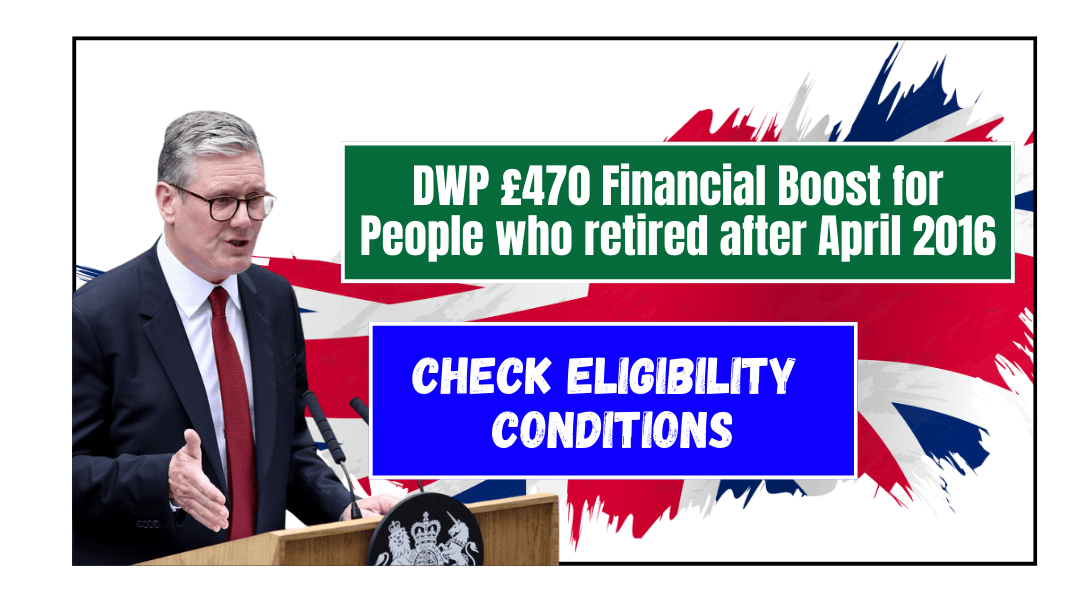The Department for Work and Pensions (DWP) has officially confirmed the State Pension will rise by 4.1% from Monday, April 7, 2025, in line with the triple lock guarantee. This rise, which kicks in as the new tax year begins, will give pensioners up to £470 extra per year, helping more than 12 million people in the UK.
This increase applies to both the basic and new State Pension and forms part of a wider package of benefit changes aimed at supporting household incomes during a time of rising living costs.
What Is the Triple Lock?
The triple lock is a government promise that guarantees the State Pension will increase every year by the highest of the following three:
- Average earnings growth
- Inflation (CPI)
- 2.5% minimum
For 2025, the increase is based on average earnings growth between May and July 2024, which came in at 4.1%—making it the deciding factor for this year’s pension boost.
How Much Will Your State Pension Rise in 2025?
| Pension Type | Previous Weekly Rate | New Weekly Rate | Annual Increase |
|---|---|---|---|
| New State Pension | £221.20 | £230.25 | £470 |
| Basic State Pension | £169.50 | £176.45 | £360 |
New State Pension Total (Annual): £11,973
Basic State Pension Total (Annual): £9,180
Who Is Eligible for Each Pension?
- New State Pension:
Men born on or after April 6, 1951, and women born on or after April 6, 1953
You must have 10+ years of National Insurance contributions to qualify, and 35 years to receive the full amount. - Basic State Pension:
For those who retired before April 2016 and have met the necessary contribution conditions.
Other Benefit Increases from April 2025
Alongside the State Pension, most means-tested benefits are also increasing:
| Benefit | Increase Rate |
|---|---|
| Universal Credit | 1.7% (inflation-based) |
| Personal Independence Payment (PIP) | 1.7% |
| Employment Support Allowance | 1.7% |
| Child Benefit | 1.7% |
| Pension Credit (Standard Minimum Guarantee) | 4.1% |
This means households on benefits will receive slightly more, though State Pensioners see the biggest uplift due to the triple lock.
What Ministers Have Said
Liz Kendall, Work and Pensions Secretary:
“Our ironclad commitment to the Triple Lock gives pensioners across the country the certainty and security they need to live a full life in retirement.”
Torsten Bell, Minister for Pensions:
“We’re improving the lives of millions of pensioners through our £7.84 billion additional funding for the State Pension this year. That means up to £470 extra in pensioners’ pockets from this week.”
The government has also reiterated efforts to boost Pension Credit uptake and invest £26 billion into the NHS, helping reduce waiting lists and improve public services.
The Bigger Picture: Is It Enough?
While the increase is welcome, it’s worth noting that according to the Pensions and Lifetime Savings Association (PLSA):
- A single pensioner needs at least £14,400 per year for a basic standard of living
- A couple needs £22,400 annually
So, despite the triple lock rise, many retirees will still fall short of the basic threshold unless they have additional income or savings.
| Key Information | Details |
|---|---|
| Increase Effective Date | Monday, April 7, 2025 |
| Annual Increase Rate | 4.1% (based on earnings growth) |
| Total New State Pension (Full Annual Amount) | £11,973 |
| Total Basic State Pension (Full Annual Amount) | £9,180 |
| Number of Pensioners Benefiting | Over 12 million |
| Government Investment in State Pension | £7.84 billion |
| State Pension Age | Currently 66, rising gradually to 68 by 2046 |
FAQ’s
When does the 2025 State Pension increase take effect?
The new State Pension rate takes effect from Monday, April 7, 2025, the first Monday of the new tax year.
How much is the State Pension increasing in 2025?
The State Pension is rising by 4.1%, adding up to £470 more per year for those on the full new State Pension.
Who qualifies for the new State Pension?
Men born on or after April 6, 1951, and women born on or after April 6, 1953, who have at least 10 years of National Insurance contributions.
Why is the increase based on earnings this year?
The State Pension follows the triple lock rule, and average earnings growth (4.1%) was higher than inflation (1.7%) and 2.5%.
Is the State Pension enough to live on?
Not entirely. The full new State Pension pays £11,973 per year, but the PLSA recommends £14,400 for a basic standard of living.






